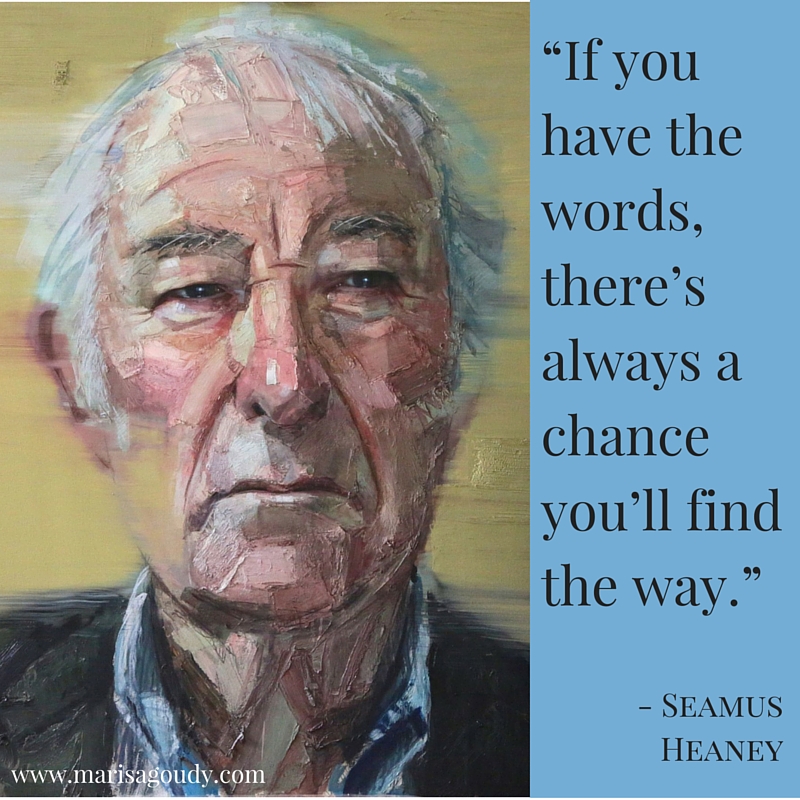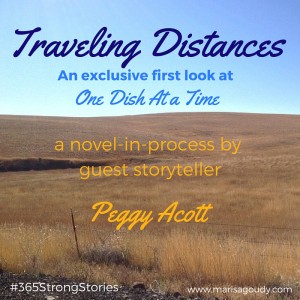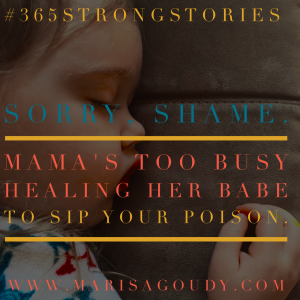
BLOG
The only inspirational quote you need as a writer & entrepreneur
 Nobel prize winning poet and Irishman Seamus Heaney's quote is scrawled on a post-it above my computer. It fights for space with love notes from my daughter and memos about my many accounting goofs, but it's the only inspirational line I keep in my line of sight.
Nobel prize winning poet and Irishman Seamus Heaney's quote is scrawled on a post-it above my computer. It fights for space with love notes from my daughter and memos about my many accounting goofs, but it's the only inspirational line I keep in my line of sight.
"If you have the words, there's always a chance you'll find the way" is the only guidance I need because it speaks to heart of my work as a writer and as an entrepreneur.
These words are going to open my Story Triangle webinar that's set for 1 PM ET tomorrow (Tuesday, April 5).
Even in our multimedia world where video talks and images sell, words are always at the heart of our work. We need the words to build the narratives that change minds and touch hearts.
We tell stories to find a way - a way to connect, to inspire, to build a business and a livelihood, and, ultimately to make this world more beautiful, bearable, and bold.
Please join me tomorrow. I'd be honored to show you a new way to use your words and stories.
The Shame of Shushed Story
“Oh honey, let’s not tell that story.” The words flowed easily from my lips but they were terribly hard to hear, hanging there in the air. I’d delivered them as kindly as I could in the voice of a woman with too many worries and too little sleep. All I wanted was the oasis of a quiet shower and to make it to my first cup of coffee before anyone pulled hair or screeched or required a bandaid.
But I know that silence and distrust and disconnection are born of distracted admonishments. This was a tiny sin that hinted at a deeper darkness.
My six year-old was remembering the beach house that the family rented for several summers. Her memories of eating a dozen clementines gave way to remembering when one older family member had fallen and knocked out a tooth.
I don’t like that memory. It was upsetting and it wasn’t pretty. I felt the pain and the worry of that Cape Cod morning. The guilt that I hadn't been very helpful at the time was (my excuse was morning sickness, but that seems paltry now). None of these thoughts were going to ease me into what was going to be another challenging day, so I shushed her and kept moving.
As I dive deep into what it means to tell stories, I'm learning just as much about how to receive and keep stories. Stories need to be held and reviewed when they bubble up. When they are stifled they become the monsters of shame and doubt and fear.
In trying to protect myself from unresolved hurts, I create new ones for my daughter. In trying to stifle the pure, spontaneous sharing of memories, I am creating new ghosts that are bound to be much more ghoulish the next time they come around.
I am a storyteller. I ask people to walk into the shadows with me so that we can appreciate the light. That means I also need to allow others to tell me their stories - even when I find them unsettling or inconvenient, even when I want to wish the memories away.
Learn how to tell your own stories with greater sensitivity and awareness. Join the free online class, The Story Triangle, on April 5.
Traveling Distances by Guest Storyteller Peggy Acott
 Why had she taken a train out of Minneapolis instead of making a direct flight to Seattle? It postponed the inevitable conversation with Bea, true, but made the anticipation of it a torment, stretching out like the endless lines of cattle fence rushing past her window; she had spent the last several hours (last several days, if she was to be truthful) running over various scripts and monologues in her head of how she was going to approach the topic with Bea. Hell, I can’t just walk into her house after all this time and say “Hi! Guess what? Daddy’s alive, but not for long, and he wants to see you.” She groaned audibly though no one heard, unless her moan got picked up by the wind and was now startling some poor prairie dog family minding their own business in their den.
But Alice couldn’t deny that she had been happy to see him, terrified by his cancer prognosis. She, who avoided all things having to do with sickness and mortality; she, who could not summon up the courage to visit her mother (for she still thought of Adriane as her mother) until the week before she died; couldn’t bear to see her sick and failing. She knew Bea was furious with her, maybe even hated her. She felt an ugly, malignant sort of cowardice that she wouldn’t admit to anyone. Well, now she was getting paid back in spades.
Why had she taken a train out of Minneapolis instead of making a direct flight to Seattle? It postponed the inevitable conversation with Bea, true, but made the anticipation of it a torment, stretching out like the endless lines of cattle fence rushing past her window; she had spent the last several hours (last several days, if she was to be truthful) running over various scripts and monologues in her head of how she was going to approach the topic with Bea. Hell, I can’t just walk into her house after all this time and say “Hi! Guess what? Daddy’s alive, but not for long, and he wants to see you.” She groaned audibly though no one heard, unless her moan got picked up by the wind and was now startling some poor prairie dog family minding their own business in their den.
But Alice couldn’t deny that she had been happy to see him, terrified by his cancer prognosis. She, who avoided all things having to do with sickness and mortality; she, who could not summon up the courage to visit her mother (for she still thought of Adriane as her mother) until the week before she died; couldn’t bear to see her sick and failing. She knew Bea was furious with her, maybe even hated her. She felt an ugly, malignant sort of cowardice that she wouldn’t admit to anyone. Well, now she was getting paid back in spades.
Alice gazed out into the distance. The parched, dry ochre hills and plains were so opposite to the life she made in the lush Hawaiian Islands; this landscape seemed like the no-man’s land threshold separating her past and her present. Unbidden, her memories started to bubble up: Daddy teaching her about fireflies; dinners around the wooden kitchen table in the dining room or the picnic table in the back yard in summer; her mother reading to her and Bea at bedtime in the room they shared, the warm pool of light from the bedside lamp illuminating the page of Wind in the Willows and their mother’s concentrated expression.
 Peggy Acott is a writer in many forms, who shamelessly takes advantage of the rainy weather in western Oregon to help maintain her (mostly) regular writing practice.
Peggy Acott is a writer in many forms, who shamelessly takes advantage of the rainy weather in western Oregon to help maintain her (mostly) regular writing practice.
The Art of the "Self-Focused First Draft"
Close the door. Write with no one looking over your shoulder. Don't try to figure out what other people want to hear from you; figure out what you have to say. It's the one and only thing you have to offer.”- Barbara Kingsolver
For years, I sighed with longing when I read this passage by Barbara Kingsolver. How fortunate she was to have such a healthy ego! How privileged she was to be the woman who could enter her writing room knowing that she had the power to author books that would sell. Maybe someday when I grew up I could be so free.
And so, I dedicated myself to looking over my own shoulder for a good five years. I hunched over the keyboard and scanned the web for clues about how to wear just the right chains for just long enough. Eventually, I prayed, I'd earn the right to tell the stories that mattered to me.
Because I thought it was part of paying my dues, I forced myself to choke down the “how to create viral content” KoolAid (even though I distrusted those marketing “gurus” and it killed my writer's soul).
Because I was so afraid of being revealed as a fraud, I avoided “real” writers at all cost. It seemed smarter to maintain a healthy distrust for artists and other free spirits who took Kingsolver at her word and created with wild abandon on the other side of the studio door. After all, they were the lucky ones. There was no use envying them their freedom when I still had dues to pay and chains to wear.
What changed? What made me finally realize that Kingsolver was right and that she is speaking to anyone who feels called to write at any point in the creative journey? I certainly didn’t “make it” using all those marketing formulas and trying to please the crowd. I dropped those chains because I had to.
Finally, I realized it was true: I didn’t have anything of worth to offer if I didn’t uncover the story that mattered to me. I was starving my creative passions and I wasn’t building a sustainable business. I was miserable and my writing wasn't connecting with anyone.
Permission to Write the Self-Focused First Draft
I completely believe that the stories that matter need to matter to you first.
You can’t stop there, of course - not if you want to turn those stories into online content that builds a community of people who want to invest in your vision. But before you start looking over your shoulder and before you start looking into the eyes of the people you want to serve, you must connect to your own stories.
Right now, I am developing a course called the You, Your Stories, and Your Audience. As you understand how to craft stories that matter to the people you wish to serve, you also learn the art of the Self-Focused First Draft.
Your SFFD will evolve into final draft that transforms your readers’ perspectives and compels them to take action. But before it’s asked to do anything so grand it’s rooted in exactly what you have to say. You'll learn that before you can dedicate yourself fully to anyone else, including your reader, you need to practice a healthy selfishness and tend to your own stories.
This course is for emerging thought leaders, especially therapists, healers, and coaches, who wants to build a business through blogging today and develop an online presence that will get them a book contract and big time speaking engagements in the future.
Get all the course details and save your seat for the May 2 launch!
Sorry, Shame: This Mama Is Too Busy Healing Her Girl to Sip Your Poison
 We didn’t quite make it a year between visits to the walk-in emergency clinic. There are three things I have learned from the early morning trip to have two-year-old fingers checked out after a door slamming incident:
We didn’t quite make it a year between visits to the walk-in emergency clinic. There are three things I have learned from the early morning trip to have two-year-old fingers checked out after a door slamming incident:
- Telling personal stories on a blog means never having to guess when past major life events occurred. They also lend you strength you may have forgotten you had.
- My little one is accident prone, tough as nails, and sweeter than I thought possible. My big one never means to hurt anyone and her feelings may be more wounded than her sister's digits if we're not careful.
- I’m still woefully and beautifully imperfect. And I am still ok with that. Shame need not apply when I'm busy healing my baby and keeping the big girl from falling into the shame spiral.
Here's an updated 2016 version of that story from last year:
One of my girls had an accident this weekend. Though it was terrifying at the time, it ended up being relatively minor. Now I can claim a parenting merit badge my mom never earned: held my daughter as she got stitched up x-rayed and told she'd merely lose a pinkie nail.
It was an accident, yes, but it could have been prevented. I could have had my hands on the kids instead of sitting an inch beyond an arm’s length away lying in bed three feet away, utterly exhausted by another night of tag teaming sleepless children. I could have said “no, honey a five year old isn’t big enough to carry her one year old sister yet.” screamed "no, you will not slam that door just because your sister is trying to come into the bathroom!"
But I didn’t.
And we ended up at the walk-in med center, covered in blood all swollen up – and sidewalk chalk and dirt from what was supposed to be a typical Saturday spent in a yard just awakening to spring still in pajamas, eyes full of sleep.
We’re so proud of our girl for healing so quickly and handling it all so well. And I’m pleased to report that I’ve emerged from shame’s shadows. Truthfully, the horrible guilt dissipated within twenty-four hours. (Likely that’s because much of the swelling did too).
Truthfully, I skipped shame all together this time because a shamed mama isn't a strong, compassionate, in control of her emotions mama who teaches her girls to be same.
No longer blinded by self-recrimination, I can simply hold my little one tight, overcome with gratitude and rendered speechless by how precious she is to me (and by utter exhaustion).
Yes, gravity won sibling rivalry made us all losers in that split second, but I forgive myself.
I’ve decided that I am mother enough for my daughters – even if I’m woefully and beautifully imperfect.

